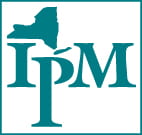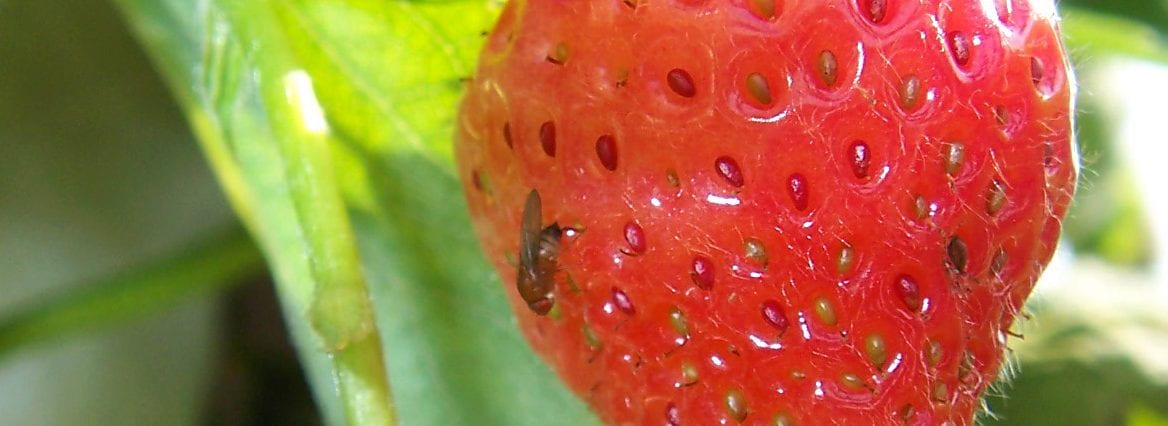On July 7, 2016, one female SWD was caught in traps set in blackberries in Saratoga County. The blackberries at this location are just starting to color, raspberries are ripe, and June strawberries are done. These traps are being monitored by Annie Mills, technician, and Laura McDermott, Extension Educator, with the Eastern NY Commercial Horticulture Program (ENYCHP), Cornell Cooperative Extension.
Rensselaer County first find
Seven male and 5 female SWD were caught on July 6, 2016 in two traps set in a hedgerow on the edge of a June strawberry planting in Rensselaer County. These traps are being monitored by Annie Mills, technician, and Laura McDermott, Extension Educator, with the Eastern NY Commercial Horticulture Program (ENYCHP), Cornell Cooperative Extension.
These traps are near a blueberry planting that is covered with exclusion netting. To date, no SWD have been caught in traps set inside the netting.
This is a fairly large number of SWD—13 total caught in the traps at this location. SWD populations are building up in this vicinity. This could be taken as a sign that populations in many locations may build up soon.
Growers should take steps to protect vulnerable fruit with an insecticide program that rotates active ingredients to prevent insecticide resistance devloping in SWD, sanitation measures to remove fruit debris and over-ripe fruit that serve as food and egg-laying resources for SWD, and establishing a cold chain after harvest, i.e. refrigerating harvested fruit to stop/kill SWD in fruit. More on SWD management is on Cornell Fruit Resources.
Erie County first find
Two female SWD were caught on July 2, 2016 in traps set in Erie County in a raspberry planting. The traps are being monitored by Sharon Bachman, Extension Educator, Erie County Cornell Cooperative Extension. There may be more SWD in the trap contents, but time has only allowed Sharon to screen a portion of the traps; enough to get this first find report out.
Sustained trap catch – many locations
Sustained trap catch reports (SWD caught in traps two weeks in a row) have come in from six locations this week.
- Yates County on July 1, 2016 - sustained catch in a raspberry planting with no fruit infestation found via salt flotation, reported by Gabrielle Brind'Amour, Greg Lob's program, Dept of Entomology, NYSAES.
- Cayuga County on July 6, 2016 - sustained catch (3 females) in a summer raspberry planting with harvest underway, reported by Nicole Mattoon and Juliet Carroll, NYS IPM Program.
- Livingston County on July 6, 2016 - sustained catch (1 female) in a blueberry planting without ripe fruit, reported by Dave Thorp, Livingston County Cornell Cooperative Extension.
- Schuyler County on July 6, 2016 - sustained catch (5 females) in a summer raspberry planting with ripe fruit, reported by Nicole Mattoon and Juliet Carroll, NYS IPM Program.
- Tioga County on July 6, 2016 - sustained catch (1 female) in a fall raspberry planting adjacent to low tunnel strawberries, reported by Margaret Ball, Tioga County Cornell Cooperative Extension.
- Ulster County on July 6, 2016 - sustained catch in a summer raspberry planting, reported by Jim O'Connell, ENYCHP and Ulster County Cornell Cooperative Extension.
Tioga County first find
Two female SWD were caught in traps in Tioga County on July 1, 2016. The traps are set in a fall raspberry planting near low tunnel strawberries. These traps are being monitored by Barb Neal, Master Gardener, and Margaret Ball, Extension Educator, Tioga County Cornell Cooperative Extension.
Please join me in welcoming Margaret to Cornell Cooperative Extension! She was just hired this month and has immersed herself in a whirlwind of SWD early arrival and trap monitoring; all during the week of the Tioga County Fair!
Clearly, 2016 is going to be a very challenging year for summer and fall raspberries, blackberries, elderberries, blueberries, and other fruit crops vulnerable to SWD infestation. Look to Cornell Fruit Resources for SWD management information.
Livingston County first find
A lone female SWD was caught in one of two traps set in a small blueberry planting in Livingston County. Traps are being monitored by Dave Thorp, Livingston County Cornell Cooperative Extension Association, and were checked on July 29, 2016.
Early blueberry varieties in Western NY are just barely blushing with color; only one or two berries per cluster are blue. The crop is not yet ripe.
Cayuga County first find
Six female SWD were caught in all four traps set in a summer raspberry planting, two within the crop and two on the edge of the planting. The traps were checked on Wednesday, June 29, 2016. Traps at this location are being monitored by Nicole Mattoon, technician with Dr. Juliet Carroll’s fruit IPM program, NYS IPM Program, Cornell University, Geneva. Summer raspberry harvest is beginning in this region.
A fruit sample of 25 ripe fruit was collected from within the planting, and whereas no evidence of eggs or larvae were seen via microscopic examination of the fruit, four eggs but no larvae were found via salt flotation. This underlines how important it will be to practice sanitation, refrigerate harvested fruit, and plan an insecticide program this year to protect vulnerable fruit crops from SWD infestation!
Schuyler County first find
One female SWD was caught in one of four traps set in a raspberry planting in Schuyler County that was checked on Wednesday, June 29, 2016. Traps at this location are being monitored by Nicole Mattoon, technician with Dr. Juliet Carroll’s fruit IPM program, NYS IPM Program, Cornell University, Geneva. The summer raspberries are beginning to ripen in this planting.
A fruit sample of 25 fruit was collected near the trap that caught the single female SWD. No evidence of eggs or larvae were seen via microscopic examination of the fruit, nor were any eggs or liarvae found via salt flotation.
This year, with the early arrival of SWD, an insecticide treatment program that incorporates rotation of active ingredients will be essential to avoid insecticide resistance developing in this insect.
Wayne County sustained catch
For two weeks in a row, SWD has been caught in traps set in a raspberry planting in Wayne County. SWD was caught in all four traps set in the planting, two within the crop and two on the edge of the panting. Four female and one male SWD were caught at this site in traps checked on Monday, June 27, 2016. Traps at this location are being monitored by Nicole Mattoon, technician with Dr. Juliet Carroll’s fruit IPM program, NYS IPM Program, Cornell University, Geneva. Summer raspberry harvest is beginning in this region.
A fruit sample of 25 fruit was collected near the edge trap that had caught a single female SWD the previous week. No evidence of eggs or larvae were seen via microscoic examination of the fruit, nor were any eggs or larvae found via salt flotation. However, it is only a matter of time before the females mate and are ready to lay eggs in the ripening crop!
Please review all management practices and monitoring tactics for this insect on Cornell Fruit Resources. It will be crucial to be proactive with SWD management and fruit sampling this year.
Plan to attend the Cornell Fruit Field Day!
Mark your calendars for the Cornell Fruit Field Day, to be held in Geneva, NY on Wednesday, July 20. The 2016 version of this triennial event will feature ongoing research in berries, hops, grapes, and tree fruit, and is being organized by Cornell University, the NYS Agricultural Experiment Station (NYSAES), the College of Agriculture and Life Sciences Fruit Program Work Team, and Cornell Cooperative Extension. All interested persons are invited to learn about the fruit research under way at Cornell University. Attendees will be able to select from tours of different fruit commodities.
- Register now! Register on the Cornell Fruit Field Day Event registration page, http://events.cals.cornell.edu/ffd2016
The event will feature a number of topics, including:
- Berries
Spotted wing drosophila (SWD) research update | Hummingbird use | SWD monitoring network | Exclusion netting against SWD in fall raspberries | Monitoring and SWD management decisions in summer raspberry & blueberry | Behavioral control of SWD with repellents and attract & kill stations | Effect of habitat diversity on ecosystem services for strawberries | High tunnel production of black and red raspberries | Day-neutral strawberries and low tunnel production
- Tree Fruits
Apple breeding & genetic studies | Research updates on fire blight, apple scab, powdery mildew | Bitter pit in Honeycrisp | 3D camera canopy imaging | Ambrosia beetle management trials | Malus selections for cider production | Precision spraying in orchards | Role of insects in spreading fire blight in apples | Bacterial canker of sweet cherry | Rootstocks & training systems for sweet cherry | NC-140 rootstock trials on Honeycrisp & SnapDragon | Pear rootstocks & training systems
- Grapes & Hops
Sour rot of grapes | VitisGen grape breeding project | Precision spraying in grapes | Managing the spread of leafroll virus in Vinifera grape using insecticides & vine removal | Early leaf removal on Riesling | Overview of NYSAES hops planting | Powdery & downy mildew management in hops | Hops weed management & mite biocontrol | Update on malting barley research
- also food safety information!
FSMA (Food Safety Modernization Act) Produce Safety Rule
- Fruit Field Day details
The event will take place at the NYSAES Fruit and Vegetable Research Farm South, 1097 County Road No. 4, 1 mile west of Pre-emption Rd. in Geneva, NY.
Arrive at 8:00 AM to get settled in. Tours begin promptly at 8:30 AM and are scheduled in the morning from 8:30 to 11:30 and in the afternoon from 1:30 to 5:00. Lunch will be served at the exhibit tent area between 11:30-12:30.
Visit sponsors anytime from 11:30-1:30! Learn about products and services from Agro Liquid | Arysta Life Science | Dow AgroSciences | Dupont | Farm Credit East, ACA | Finger Lakes Trellis Supply | LaGasse Works, Inc. | Lakeview Vineyard Equipment | NY Apple Sales | OESCO, Inc | Red Jacket Orchards | Superior Wind Machine Service | Valent USA Corp. | Wafler Farms | tastings from War Horse Brewing
To participate as a sponsor, see the registration page or contact Shelly Cowles (315-787-2274; mw69@cornell.edu).
- Register now!
Admission fee is $50/person ($40 for additional attendees from the same farm or business). Your admission covers tours, lunch and educational materials. Pre-registration is required. Walk-in registration may be available for a $10 surcharge on the day of the event. Register on the Cornell Fruit Field Day Event registration page, http://events.cals.cornell.edu/ffd2016

